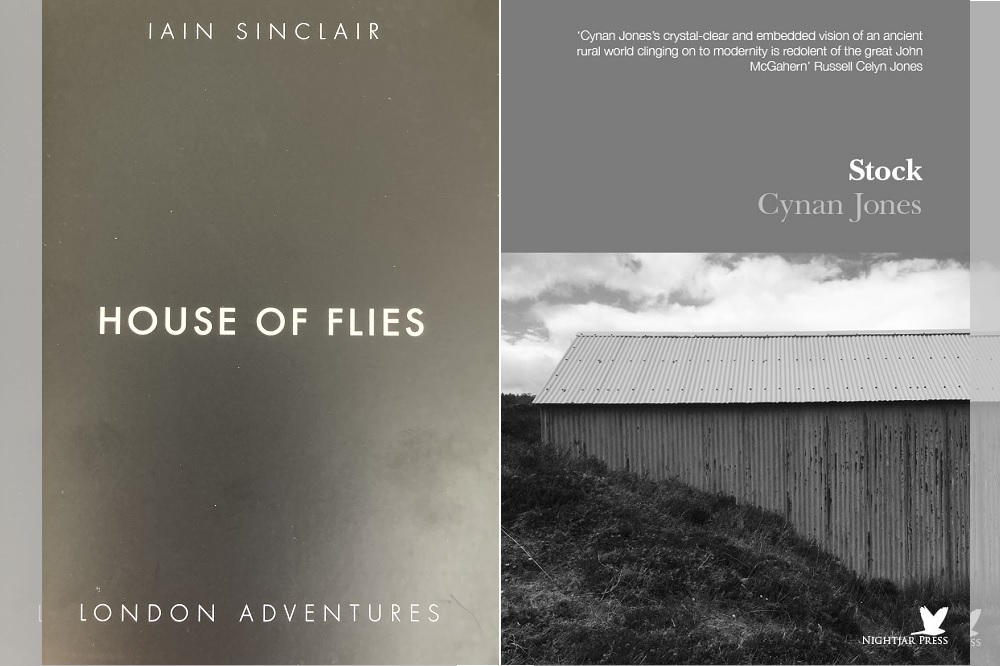Review: House of Flies by Iain Sinclair and Stock by Cynan Jones

Jon Gower
Like the proverbial buses, two short stories arrive at the same time, being tales from two very different writers but each one presented in smart, simple livery and sold as stand-alones. They add to the sense of the short story being in robust good health in Wales.
One only has to think of the work of such practitioners as Jo Lloyd, Jane Fraser and Rhiannon Lewis to hear the strong pulse and lively beat of the form.
Cynan Jones is easily one of the best writers around, a master of concision and concentration, paring down his prose until it is lean, taut and tight.
His latest offering, “Stock” has been described as a ‘crystal-clear and embedded vision of an ancient rural world clinging on to modernity…”…redolent of the great Irish writer John McGahern.
Jones does, indeed share a sense of change being wrought and old ways being lost, in Jones’ native Ceredigion just as in McGahern’s County Leitrim.
So Jones notes ‘That if things don’t stop everything will just be gone, will go. And we will not get it back.
Even the shops have gone. Chapels. Now the schools.
The little shop.
No.
Stop.
They’re already hammering away inside the chapel, turning the house of God into a private dwelling. The Full Fat milk isn’t what it used to be. Even nature is not immune to the changes all around.
The story starts on the edge of a ‘devastated plantation’ where an unpronounceable disease has led to legal notices being issued before felling the infected trees, which suffer the same fate as ash trees affected by dieback, which have already been cut down.
And there are changes in the places too. Pencarreg’s a second home, now all posh gravel and solar panels. The old chap, Irfon at Maes Isaf has the carers in.
In the face of such overwhelming change the hero of the story decides take matters into his own hands. In order to protect the local shop he picks up a gun and works out a way to stop the supermarket delivery vans that are threatening its existence.
I won’t give too much away about the how and what of it all but let’s say it all gets a bit Tarantino near Tyddyn Llwyd.
As with so much of Cynan Jones’ writing the skill inherent in the stories isn’t just inventiveness but in the fine detail of the words.
The thwock thwock of the wind turbines’ as they beat on the breeze, the sounds of little birds as they make ‘subdued djeeps, the sound of a squeeze dog toy’ or the ‘tone-change,’ ‘the lowered gurn as the van geared down in anticipation.’
The reader has the delight of seeing precision in play, as the actor makes each word count, or sing, or just add to the world of the story.
Unreachable past
The Cardiff-born writer and psycho-geographer Iain Sinclair is a very different proposition. It’s dense, allusive, fact-crammed material. One thinks of Louis MacNeice’s poem “Snow” in which he sees that the “World is crazier and more of it than we think,/ Incorrigibly plural…’
Sinclair certainly packs a lot into “House of Flies,” a story which returns to territory very familiar to readers of his work, not least the world of small bookshops and early-morning markets, which he knew intimately well when when he ran his own stall in Camden Passage.
In this latest story – published by the plucky Newport-based Three Impostors as part of their ongoing exploration of the work and influence of the “Celtic magician” Arthur Machen – the unholy grail is a set of ‘horror tales’ composed by Machen for a ‘fugitive publication that collapsed before his anguished efforts could appear in print.’
Such items are part of the contents of a bookshop owned by the legendary dealer Nicholas Lane who has passed away, leaving his fellow bibliophiles excited and strung out at the prospect of all the items he owned now belonging in an ‘unreachable past.’ They gather like flies at his deathbed.
The story chases Machen’s shade all across London, through the groves of Gray’s Inn and past Canolfan Cymry Llundain, a ‘centre for migrant Welsh making good with their cows and dairies and television careers in the foreign capital.’
Strange routes are followed, some already walked by ‘crocodiles of Machen enthusiasts who excavated every published instruction and came no closer to find the floating gardens, Poe’s boarding school, or the reason why confirming a route was the best way of securing its mysteries for another generation.’
“House of Flies’ is a tale with a suitably Machen-esque ending, a complete and entomological transformation which explains the story’s title and is deftly done.
If you’ve enjoyed Sinclair’s London Orbital or The Last London there’s plenty here to savour, along with the author’s hallmark love of obscure writers, or those fading from fame as well as his deeply detailed knowledge of city signs, graves, lost alleyways and the complex skullduggery of the second hand book trade, where dealers might even kill someone for a pristine, if slightly foxed first edition. Or even a rare, signed pamphlet.
Stock by Cynan Jones is published by Nightjar Press while Iain Sinclair’s House of Flies is published by Three Impostors.
It is already sold out at the publishers but, in keeping with the subject of the story, there is a list of London bookshops that might have a copy here.
Support our Nation today
For the price of a cup of coffee a month you can help us create an independent, not-for-profit, national news service for the people of Wales, by the people of Wales.





